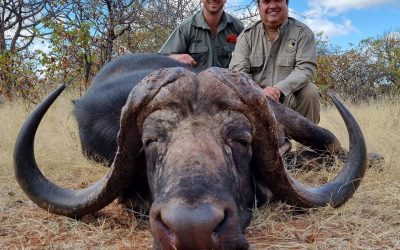So, you’ve got this burning question on your mind: Can I hunt with dogs in Africa? Well, my friend, you’re in luck because I’ve got all the inside scoop for you. Africa, known for its diverse wildlife, is a dream destination for many hunting enthusiasts. But when it comes to using dogs during the hunt, things can get a little tricky. While some countries in Africa do allow hunting with dogs, others have strict regulations in place to protect the wildlife. In this article, we’ll explore the rules and regulations surrounding hunting with dogs in Africa, giving you the lowdown on how to make your dream hunt a reality. Get ready to embark on an exciting adventure as we navigate the ins and outs of hunting with dogs in the magnificent African continent.
Legal Considerations
Understanding local laws
Before considering hunting with dogs in Africa, it is crucial to understand the local laws and regulations regarding this practice. Each country may have different rules and requirements, so it is essential to familiarize yourself with the legal aspects of hunting with dogs in your chosen destination.
Researching specific countries’ regulations
Researching the specific regulations of each country is vital when planning a hunting trip with dogs in Africa. Different nations may have varying laws regarding the use of dogs for hunting, such as the type of game allowed to be hunted or the required permits and licenses for hunting with dogs.
Obtaining necessary permits or licenses
Once you have chosen the country where you plan to hunt with dogs, it is essential to obtain the necessary permits or licenses. These documents will ensure that you are legally allowed to engage in this activity and avoid any legal issues during your hunting trip.
Consulting with local authorities or hunting associations
To ensure compliance with local regulations and practices, it is advisable to consult with local authorities or hunting associations in the chosen country. They can provide valuable insights, guidance, and up-to-date information on hunting with dogs and help navigate any legal considerations that may arise.
Hunting with Dogs in Africa
Types of hunting that involve dogs
In Africa, several types of hunting involve the use of dogs. These include tracking and trailing game, flushing out small game or birds, and holding larger game at bay until the hunter arrives. Dogs can bring a unique set of skills and instincts to the hunting experience, making them valuable hunting companions.
Benefits and challenges of hunting with dogs
Hunting with dogs in Africa offers several benefits, such as increased chances of locating and flushing out game, added protection from dangerous wildlife encounters, and the opportunity to form a close bond with your canine hunting partners. However, there are also challenges to consider, such as the need for specialized training and handling, potential risks to the dogs’ safety, and ethical considerations surrounding the use of animals in hunting.
Ethical considerations in hunting with dogs
When hunting with dogs, it is crucial to consider ethical considerations. This includes minimizing unnecessary harm to the animals being hunted, ensuring fair chase, and respecting the environment and local communities. Upholding ethical hunting practices involves understanding and adhering to local hunting regulations, practicing selective and sustainable hunting, and prioritizing conservation efforts.
Popular dog breeds used in African hunting
Certain dog breeds have been favored for hunting in Africa due to their natural hunting instincts, endurance, and ability to adapt to the local terrain and climate. Some popular dog breeds used in African hunting include Rhodesian Ridgebacks, Africanis, Boerboels, and various sighthound breeds such as Salukis and Greyhounds.
Training and preparation for hunting with dogs
Training and preparation are crucial before embarking on a hunting trip with dogs in Africa. Dogs should receive proper training to develop skills like tracking, obeying commands, and responding appropriately to wildlife encounters. Additionally, hunters should ensure they have the necessary supplies, equipment, and knowledge to provide proper care and safety for their canine hunting companions throughout the trip.
Countries that Allow Hunting with Dogs
South Africa
South Africa allows hunting with dogs, provided that hunters comply with the country’s regulations and obtain the appropriate permits and licenses.
Namibia
Namibia permits hunting with dogs under specific regulations and licensing requirements. It is essential to carefully review and adhere to these regulations when planning a dog-assisted hunting trip in Namibia.
Zimbabwe
Zimbabwe allows hunting with dogs, but hunters must comply with the country’s regulations, obtain the necessary permits, and hunt within designated areas and seasons.
Tanzania
In Tanzania, hunting with dogs is permitted for certain game species, subject to strict regulations, licensing, and permits. It is important to consult with local authorities and hunting associations for detailed information.
Mozambique
Mozambique permits hunting with dogs in some areas, but specific regulations and licenses must be obtained and followed. It is vital to conduct thorough research and comply with all legal requirements.
Botswana
Botswana allows hunting with dogs, but it is essential to obtain appropriate permits and adhere to the country’s regulations regarding hunting seasons, areas, and species.
Kenya
Kenya has strict laws and regulations that generally prohibit hunting with dogs. It is important to respect and adhere to these regulations when visiting the country.
Uganda
Uganda generally does not permit hunting with dogs, except for certain limited exceptions. It is crucial to review and comply with the country’s regulations regarding hunting practices.
Zambia
Zambia permits hunting with dogs, but hunters must adhere to the country’s regulations and obtain the required permits and licenses.
Ethiopia
Ethiopia allows hunting with dogs under specific regulations and licenses. It is essential to research and comply with the country’s regulations when planning a dog-assisted hunting trip in Ethiopia.
Countries that Restrict or Ban Hunting with Dogs
Angola
Angola generally does not permit hunting with dogs, and hunters must comply with the country’s regulations and restrictions on hunting practices.
Cameroon
Cameroon restricts hunting with dogs in certain areas, and hunters must adhere to the country’s regulations and obtain the necessary permits and licenses.
Central African Republic
Central African Republic generally does not allow hunting with dogs. Hunters must respect and comply with the country’s regulations and restrictions on hunting.
Chad
Chad has restrictions on hunting with dogs, and hunters must adhere to the country’s regulations and obtain the required permits and licenses when engaging in this activity.
Democratic Republic of the Congo
The Democratic Republic of the Congo generally prohibits hunting with dogs. Hunters must respect and comply with the country’s regulations and restrictions on hunting practices.
Ivory Coast
Ivory Coast generally does not permit hunting with dogs. It is crucial to respect and adhere to the country’s regulations and restrictions on hunting activities.
Gabon
Gabon restricts hunting with dogs in certain areas, and hunters must follow the country’s regulations and obtain the necessary permits and licenses to engage in this activity.
Senegal
Senegal generally does not permit hunting with dogs, and hunters must comply with the country’s regulations and restrictions on hunting practices.
Sudan
Sudan has restrictions on hunting with dogs, and hunters must adhere to the country’s regulations and obtain the required permits and licenses when engaging in this activity.
South Sudan
South Sudan generally does not allow hunting with dogs. Hunters must respect and comply with the country’s regulations and restrictions on hunting practices.
Conservation Efforts
The impact of hunting with dogs on wildlife populations
Hunting with dogs, when responsibly practiced, can have both positive and negative impacts on wildlife populations. It can contribute to the conservation of certain species by managing population numbers and preventing overgrazing or habitat destruction. However, unsustainable hunting practices or targeting endangered species can have detrimental effects on wildlife populations.
Initiatives promoting sustainable hunting practices
Numerous initiatives and organizations in Africa are dedicated to promoting sustainable hunting practices. These initiatives aim to educate hunters on ethical hunting principles, wildlife conservation, and the preservation of natural habitats. By emphasizing the importance of responsible hunting, these organizations strive to ensure the long-term stability of wildlife populations.
Conservation organizations’ perspectives on hunting with dogs
Conservation organizations have varied perspectives on hunting with dogs, depending on their objectives and values. Some organizations consider dog-assisted hunting an effective wildlife management tool when practiced sustainably and in accordance with regulations. Others may have concerns about the potential negative impacts on wildlife and advocate for stricter regulations or even bans on hunting with dogs.
Contributions of revenue from hunting with dogs to conservation
When hunting with dogs is conducted sustainably and regulated effectively, it can contribute to conservation efforts through the revenue generated. Hunting fees, permits, and licenses often help fund conservation initiatives, anti-poaching activities, habitat restoration, and community-based conservation projects, ultimately benefiting wildlife and their ecosystems.
Alternatives to Hunting with Dogs
Photographic safaris and eco-tourism
For those who prefer non-consumptive forms of wildlife experiences, photographic safaris and eco-tourism offer an alternative to hunting with dogs. These activities focus on observing and photographing wildlife in their natural habitats, supporting local economies, and promoting conservation without direct harm to animals.
Canned hunting and captive predator interactions
While controversial, canned hunting and captive predator interactions provide an alternative option for those seeking a hunting-like experience without the use of dogs. However, it is essential to critically examine the ethical considerations and potential impacts on conservation before engaging in these activities.
Game drives and traditional hunting methods
Game drives, where skilled guides navigate visitors through wildlife-rich areas, allow for up-close encounters with animals while adhering to ethical and sustainable tourism practices. Additionally, participating in traditional hunting methods, guided by local communities’ cultural practices and regulations, can provide a unique hunting experience.
Participating in community-based conservation projects
An alternative approach to hunting with dogs is to support community-based conservation projects. By engaging in initiatives that focus on protecting wildlife, promoting sustainable land management, and empowering local communities, individuals can contribute to conservation efforts while forging meaningful connections with the environment and local cultures.
Health and Safety Concerns
Risks of injuries to dogs during hunts
When hunting with dogs, there is always a risk of injuries to the dogs involved. This can include encounters with wildlife, terrain-related accidents, or exposure to diseases. Adequate training, supervision, and proper care are essential to minimize the risks and ensure the dogs’ well-being during hunting expeditions.
Dangers posed by wildlife encounters
Hunting with dogs in Africa involves potential encounters with dangerous wildlife. It is crucial to prioritize safety and be prepared to handle these encounters effectively. Knowledge of animal behavior, appropriate equipment, and working closely with experienced guides or handlers can help mitigate the dangers posed by wildlife encounters.
Disease prevention for dogs and hunters
Disease prevention is a crucial aspect of hunting with dogs in Africa. Dogs should be vaccinated against common diseases and regularly checked for any signs of illness. Hunters should also take precautions to protect themselves from vector-borne diseases and zoonotic infections that can be transmitted by wildlife.
Emergency medical care availability in remote areas
When hunting with dogs in Africa, it is important to consider the availability of emergency medical care, especially when venturing into remote areas. Access to medical facilities and assistance in case of injuries to both dogs and hunters should be thoroughly researched and considered before embarking on a hunting trip.
Cultural and Historical Significance
Hunting practices in indigenous African cultures
Hunting has played a significant role in indigenous African cultures for centuries. It has traditionally served as a means of sustenance, self-expression, and cultural preservation. Understanding and respecting the cultural significance of hunting practices in Africa can facilitate a deeper appreciation of the historical connections between humans, wildlife, and the land.
Evolution of hunting with dogs in Africa
The use of dogs in hunting has evolved over time in Africa. Initially, dogs were domesticated for purposes such as guarding and herding. However, their natural instincts and abilities were eventually recognized and utilized for hunting purposes. Understanding the evolution of hunting with dogs in Africa helps shed light on the historical relationship between humans, dogs, and the natural world.
Preserving cultural heritage through responsible hunting
Responsible hunting practices can play a crucial role in preserving the cultural heritage of African communities. Valuing traditional hunting knowledge, promoting sustainable hunting practices, and respecting local customs and regulations can help ensure the preservation of cultural heritage while safeguarding wildlife populations and their habitats.
The Future of Hunting with Dogs in Africa
Changing attitudes towards hunting with dogs
Attitudes towards hunting with dogs in Africa are gradually evolving. With increased awareness of conservation concerns, animal welfare, and ethical considerations, there is a growing emphasis on sustainable and responsible hunting practices. Striking a balance between cultural traditions, conservation objectives, and evolving societal values will shape the future of hunting with dogs in Africa.
Effects of trophy hunting bans on dog-assisted hunting
Trophy hunting bans, implemented in certain countries or regions, can have implications for dog-assisted hunting in Africa. While some argue that bans help protect wildlife populations, others assert that well-regulated trophy hunting can contribute to conservation efforts. The potential effects of these bans on African hunting traditions, including those involving dogs, remain a topic of ongoing debate.
Role of education and awareness in shaping the future
Education and awareness initiatives play a crucial role in shaping the future of hunting with dogs in Africa. By promoting ecological literacy, ethical hunting practices, and an understanding of the importance of conservation, individuals can contribute to a sustainable future for hunting and ensure the well-being of both wildlife and the environment.
Balancing the needs of local communities and conservation
The future of hunting with dogs in Africa hinges on finding a delicate balance between the needs of local communities and conservation objectives. Recognizing and respecting the rights of indigenous communities, involving them in decision-making processes, and implementing sustainable hunting practices can help foster cooperation and ensure the long-term viability of both cultures and wildlife.
Conclusion
Weighing the pros and cons of hunting with dogs in Africa requires careful consideration of legal, ethical, and practical aspects. Understanding local laws, researching country-specific regulations, obtaining necessary permits, and consulting with local authorities play a crucial role in ensuring compliance with legal requirements. Factors such as the types of hunting with dogs, benefits and challenges, cultural significance, and health and safety concerns should also be carefully evaluated.
Ultimately, the decision to hunt with dogs in Africa is a personal one, influenced by individual values, ethics, and preferences. Considering alternative forms of wildlife experiences, engaging in community-based conservation projects, and contributing to conservation efforts can provide fulfilling and meaningful ways to connect with the natural world while honoring the diverse hunting traditions and cultural heritage of Africa.










